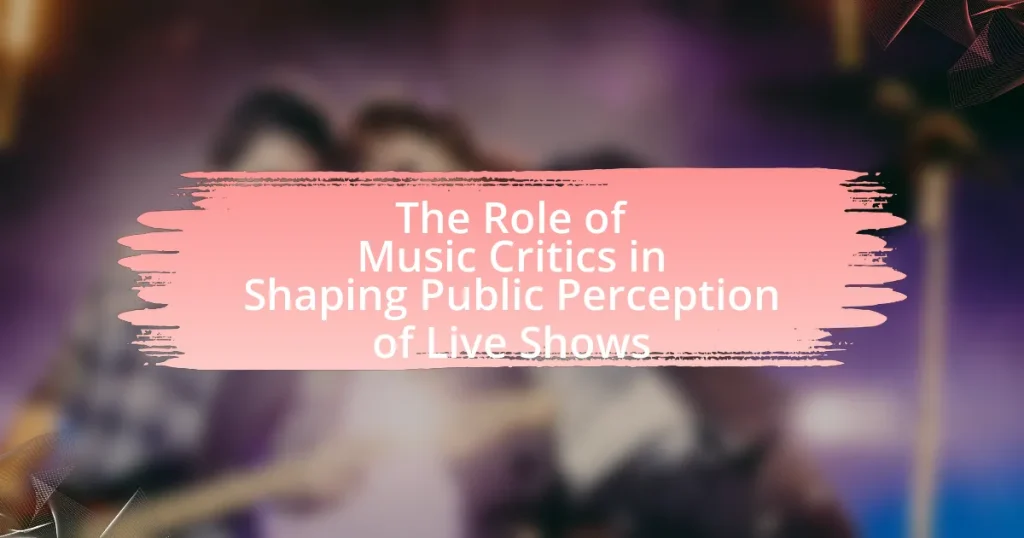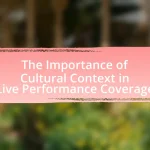Music critics play a vital role in shaping public perception of live shows by influencing audience expectations and artist reputations through their evaluations. Their reviews assess performance quality, stage presence, and audience engagement, which can significantly affect ticket sales and attendance. Research indicates that a substantial percentage of concertgoers consult critics’ reviews before attending events, highlighting the critics’ impact on public opinion. The article explores the factors critics consider when reviewing performances, the consequences of their evaluations on artists’ careers, and the historical context that has shaped their role in the music industry. Additionally, it examines how critics contribute to the cultural significance of live shows and the standards of various music genres.
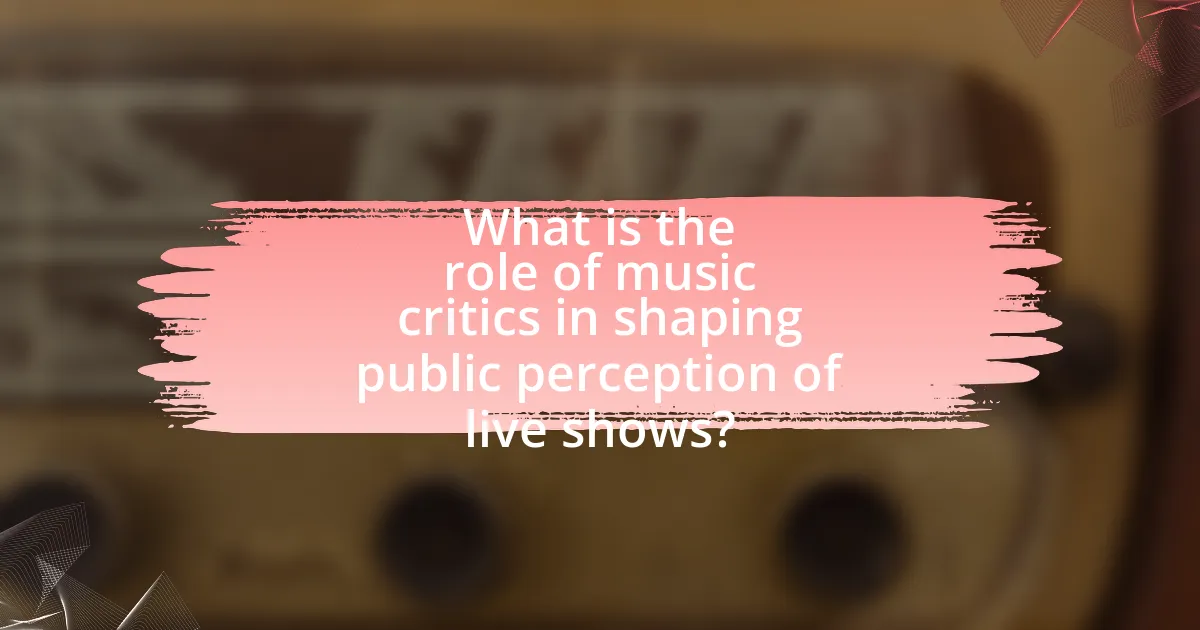
What is the role of music critics in shaping public perception of live shows?
Music critics play a crucial role in shaping public perception of live shows by providing evaluations that influence audience expectations and artist reputations. Their reviews often highlight aspects such as performance quality, stage presence, and audience engagement, which can significantly impact ticket sales and future attendance. For instance, a positive review from a respected critic can elevate an artist’s status, while a negative critique can deter potential attendees. Research indicates that 70% of concertgoers consult reviews before attending a show, underscoring the critics’ influence on public opinion and decision-making.
How do music critics influence audience expectations?
Music critics influence audience expectations by providing assessments and interpretations of musical performances, which shape how listeners perceive upcoming shows. Their reviews often highlight specific elements such as vocal performance, instrumentation, and stage presence, setting a benchmark for what audiences anticipate. For instance, a positive review can elevate expectations, while a negative critique may lead to diminished interest. Research indicates that critics’ opinions can significantly impact ticket sales and audience turnout, as seen in studies showing that favorable reviews correlate with increased attendance at live events.
What factors do critics consider when reviewing live performances?
Critics consider several key factors when reviewing live performances, including the quality of the performance, audience engagement, and production elements. The quality of the performance encompasses the musicians’ technical skills, vocal abilities, and overall artistry, which are essential for a successful show. Audience engagement refers to how well the performers connect with the audience, influencing the overall atmosphere and enjoyment of the event. Production elements include stage design, lighting, and sound quality, which significantly impact the audience’s experience. These factors collectively shape the critics’ evaluations and influence public perception of the live show.
How do critics’ reviews impact ticket sales and attendance?
Critics’ reviews significantly impact ticket sales and attendance by influencing public perception and consumer behavior. Positive reviews often lead to increased interest and higher ticket sales, as audiences tend to trust critics’ opinions when deciding which shows to attend. For instance, a study by the National Bureau of Economic Research found that a one-star increase in a critic’s rating can lead to a 5-10% increase in ticket sales for live performances. Conversely, negative reviews can deter potential attendees, resulting in lower sales and reduced audience turnout. This relationship underscores the critical role that music critics play in shaping the success of live shows.
Why are music critics important in the live music industry?
Music critics are important in the live music industry because they influence public perception and can significantly impact an artist’s reputation and ticket sales. Their reviews provide insights into performances, helping audiences decide which shows to attend. For instance, a positive review from a reputable critic can lead to increased interest and attendance, while a negative review can deter potential concert-goers. According to a study published in the Journal of Cultural Economics, critics’ reviews can affect box office revenues, demonstrating their role in shaping the commercial success of live performances.
What historical context has shaped the role of music critics?
The role of music critics has been shaped by the evolution of music journalism, particularly from the late 19th century to the present. In the late 1800s, the rise of popular music genres and the establishment of music publications created a demand for informed opinions, leading to the emergence of critics as influential voices in the music industry. The advent of radio and television in the 20th century further amplified their reach, allowing critics to shape public perception through reviews and commentary. Additionally, the counterculture movements of the 1960s and 1970s positioned critics as cultural arbiters, often influencing the success of artists and genres. The digital age has since transformed music criticism, with online platforms enabling broader access and diverse voices, yet the foundational role of critics in guiding public taste remains significant.
How do critics contribute to the cultural significance of live shows?
Critics contribute to the cultural significance of live shows by providing informed analysis and interpretation that shapes public perception. Their reviews often highlight the artistic merit, social context, and emotional impact of performances, influencing audience expectations and engagement. For instance, a positive review from a reputable critic can elevate a show’s status, leading to increased attendance and cultural discourse, while negative critiques can prompt reflection on artistic choices and societal themes. This dynamic interaction between critics and audiences fosters a deeper understanding of the cultural landscape surrounding live performances.
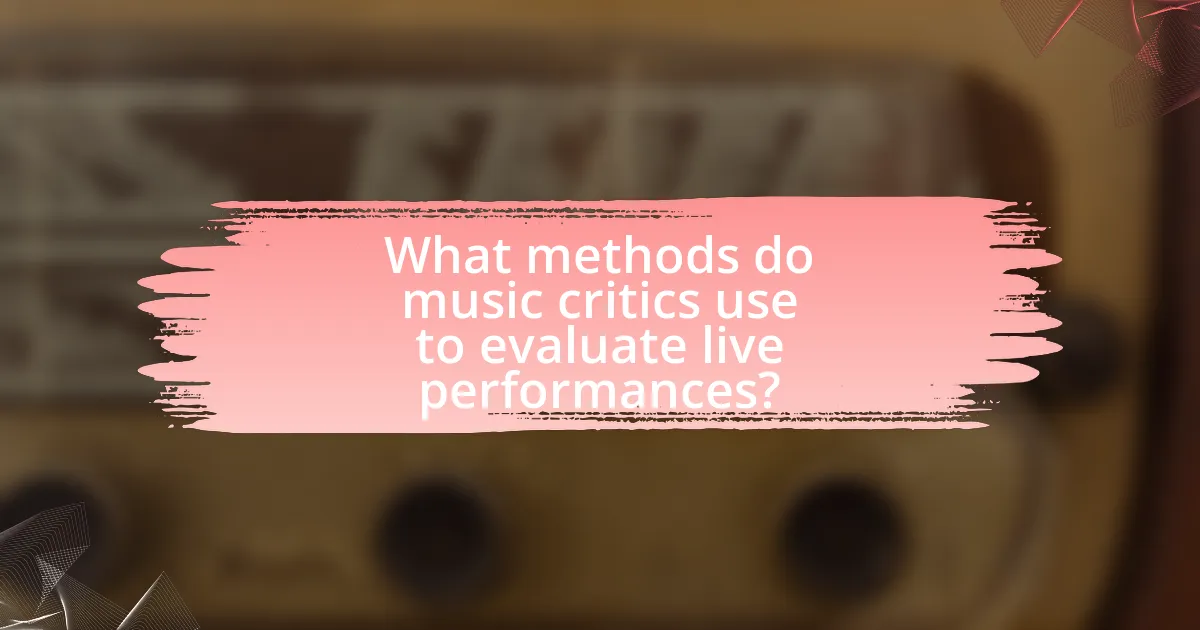
What methods do music critics use to evaluate live performances?
Music critics evaluate live performances using several methods, including analysis of musicality, stage presence, audience engagement, and technical execution. Critics assess musicality by examining the quality of the performance, such as pitch accuracy and rhythm, while stage presence involves evaluating the artist’s charisma and ability to connect with the audience. Audience engagement is measured through the crowd’s reactions and participation, indicating the performance’s impact. Technical execution refers to the musicians’ proficiency with their instruments and overall sound quality. These methods are supported by established practices in music journalism, where critics often reference specific examples from performances to substantiate their evaluations.
How do critics assess the quality of a live show?
Critics assess the quality of a live show by evaluating various elements such as performance, audience engagement, and production value. They analyze the musicians’ technical skills, stage presence, and emotional connection with the audience, which are crucial indicators of a successful performance. Additionally, critics consider the overall atmosphere, including sound quality, lighting, and set design, as these factors contribute to the audience’s experience. For instance, a study published in the Journal of Arts Management, Law, and Society highlights that critics often rely on their expertise and experience to provide a comprehensive review, which can influence public perception and attendance at future shows.
What criteria are commonly used in live performance reviews?
Common criteria used in live performance reviews include vocal performance, musicianship, stage presence, audience engagement, and overall production quality. Vocal performance assesses the singer’s technical ability and emotional delivery, while musicianship evaluates the skill and cohesion of the band. Stage presence refers to the artist’s charisma and ability to connect with the audience. Audience engagement measures how well the performer interacts with the crowd, and overall production quality encompasses sound, lighting, and visual elements. These criteria are essential for critics to provide a comprehensive evaluation of a live show, influencing public perception and audience expectations.
How do personal biases affect critics’ evaluations?
Personal biases significantly influence critics’ evaluations by shaping their perceptions and judgments about music performances. Critics may favor certain genres, artists, or styles based on their individual experiences, cultural backgrounds, or preferences, leading to subjective assessments that can skew public perception. For instance, a critic with a strong affinity for rock music may rate a rock concert more favorably than a pop concert, regardless of the actual quality of the performances. This tendency is supported by research indicating that critics’ backgrounds and personal tastes can lead to inconsistent evaluations across similar performances, ultimately affecting how audiences perceive the value and quality of live shows.
What role does audience feedback play in critics’ reviews?
Audience feedback significantly influences critics’ reviews by providing a broader context for the reception of live performances. Critics often consider audience reactions, such as applause, engagement, and social media commentary, to gauge the overall impact of a show. For instance, a study published in the Journal of Arts Management, Law, and Society found that critics who incorporated audience sentiment into their reviews were more aligned with public opinion, enhancing the credibility of their assessments. This interplay between audience feedback and critical analysis helps shape the narrative around live shows, ultimately affecting public perception and attendance.
How do critics incorporate social media reactions into their assessments?
Critics incorporate social media reactions into their assessments by analyzing audience feedback and sentiment expressed on platforms like Twitter, Instagram, and Facebook. This analysis allows critics to gauge public opinion and trends surrounding live shows, providing a broader context for their evaluations. For instance, critics may reference viral posts or trending hashtags that reflect audience enthusiasm or disappointment, thereby enriching their reviews with real-time reactions. By integrating these social media insights, critics can offer a more nuanced perspective that aligns with the collective experience of concertgoers, ultimately influencing how the public perceives the performance.
What is the relationship between critics and the audience’s perception?
Critics significantly influence the audience’s perception by providing expert evaluations that shape public opinion. Their reviews often serve as a guide for potential attendees, impacting decisions on whether to attend a live show. For instance, a positive review from a reputable critic can enhance the perceived value of a performance, leading to increased ticket sales, while a negative review can deter audiences. Research indicates that audiences often rely on critics’ insights, as seen in studies showing that 70% of concertgoers consult reviews before attending events. This relationship underscores the power critics hold in framing the narrative around live performances, ultimately affecting audience engagement and attendance.
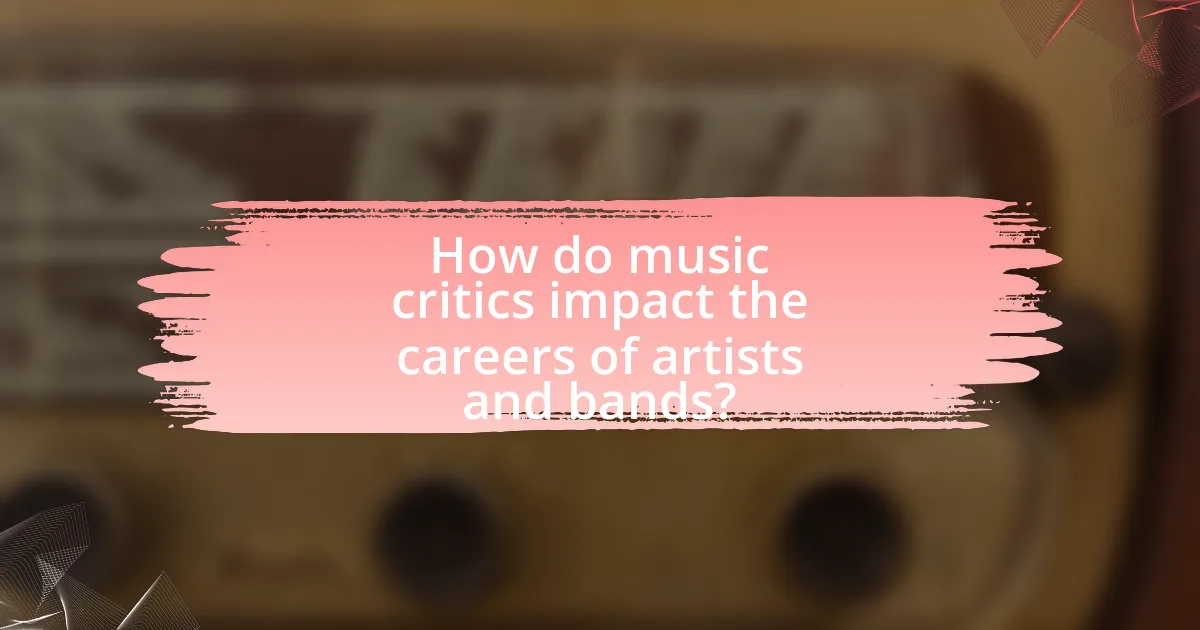
How do music critics impact the careers of artists and bands?
Music critics significantly impact the careers of artists and bands by influencing public perception and media coverage. Positive reviews can lead to increased visibility, higher album sales, and more concert attendance, while negative critiques can hinder an artist’s success. For instance, a favorable review in a prominent publication can elevate an artist’s profile, as seen with the critical acclaim received by bands like Arcade Fire, which contributed to their Grammy wins and commercial success. Conversely, negative reviews can result in diminished interest, as evidenced by the backlash faced by artists like Lana Del Rey after critical scrutiny of her live performances. Thus, music critics play a crucial role in shaping the trajectory of artists’ careers through their evaluations and the subsequent public response.
What are the potential consequences of a negative review?
A negative review can significantly impact an artist’s reputation and ticket sales. When a music critic publishes a negative review, it can lead to decreased public interest in the artist’s performances, resulting in lower attendance at live shows. For instance, a study by the University of Southern California found that negative reviews can lead to a 20% drop in ticket sales for concerts. Additionally, negative reviews can damage the artist’s brand, making it harder for them to secure future gigs or collaborations. This illustrates how the influence of music critics can shape public perception and ultimately affect an artist’s career trajectory.
How can positive reviews enhance an artist’s reputation?
Positive reviews can significantly enhance an artist’s reputation by increasing their visibility and credibility within the music industry. When critics provide favorable assessments, it often leads to greater media coverage and public interest, which can translate into higher ticket sales and streaming numbers. For instance, a study published in the Journal of Cultural Economics found that positive reviews can lead to a 20% increase in album sales for artists. This heightened exposure not only attracts new fans but also reinforces the artist’s standing among existing followers, ultimately solidifying their reputation as a respected figure in the music scene.
What role do critics play in the discovery of new talent?
Critics play a crucial role in the discovery of new talent by providing visibility and validation to emerging artists. Their reviews and critiques can significantly influence public interest and industry attention, often leading to increased opportunities for new musicians. For instance, a positive review from a reputable critic can elevate an artist’s profile, resulting in more concert bookings, media coverage, and streaming engagement. Historical examples include the impact of influential music critics like Lester Bangs and Robert Christgau, whose endorsements helped launch the careers of numerous artists in the 1970s and 1980s. Thus, critics serve as gatekeepers and tastemakers, shaping the landscape of new talent in the music industry.
How do critics’ reviews shape the evolution of music genres?
Critics’ reviews significantly influence the evolution of music genres by shaping public perception and guiding listener preferences. When critics highlight specific elements of a genre, such as innovative techniques or thematic depth, they can elevate certain artists or styles, prompting audiences to explore and embrace these aspects. For instance, the rise of punk rock in the 1970s was propelled by influential reviews that emphasized its raw energy and anti-establishment themes, leading to increased popularity and the emergence of subgenres. Additionally, critics often serve as gatekeepers, determining which artists gain visibility and credibility, thereby impacting the trajectory of musical trends and the development of new genres.
What influence do critics have on emerging trends in live music?
Critics significantly influence emerging trends in live music by shaping public perception and guiding audience preferences. Their reviews and analyses can elevate certain genres, artists, or performance styles, leading to increased visibility and popularity. For instance, when influential critics endorse a new artist or genre, it often results in heightened media coverage and audience interest, as seen with the rise of indie music in the early 2000s, which was propelled by critical acclaim from major publications. Additionally, critics often highlight innovative performance techniques or thematic elements, prompting artists to adapt and evolve their live shows to meet audience expectations shaped by these critiques. This dynamic interaction between critics and artists ultimately drives the evolution of live music trends.
How do critics help define the standards of different music genres?
Critics help define the standards of different music genres by evaluating and articulating the qualities that characterize each genre. Through reviews, critiques, and analyses, critics establish benchmarks for musical composition, performance, and production that audiences and artists reference. For example, in genres like jazz, critics often highlight improvisation and technical skill as essential elements, influencing both listener expectations and artist practices. This evaluative process is supported by historical context, such as the establishment of the Grammy Awards, which recognizes excellence in various genres, further solidifying the standards set by critics.
What best practices should critics follow to maintain credibility?
Critics should adhere to objectivity, thorough research, and transparency to maintain credibility. Objectivity ensures that reviews are based on the performance rather than personal biases, allowing critics to provide fair assessments. Thorough research involves understanding the context of the performance, including the artist’s background and the genre’s conventions, which enhances the critic’s authority. Transparency about potential conflicts of interest, such as personal relationships with artists or financial ties, fosters trust with the audience. These practices are supported by studies indicating that audiences value impartiality and informed perspectives in reviews, which ultimately strengthens the critic’s reputation and influence in shaping public perception of live shows.
How can critics balance personal opinion with objective analysis?
Critics can balance personal opinion with objective analysis by employing a structured framework that separates subjective feelings from factual observations. This involves clearly identifying personal biases and ensuring that reviews are grounded in measurable criteria such as performance quality, technical skill, and audience engagement. For instance, a critic might express a personal preference for a particular genre while simultaneously evaluating a live show based on specific metrics like vocal clarity, stage presence, and setlist diversity. By using established standards within the music industry, critics can provide a balanced perspective that acknowledges personal taste while maintaining credibility through objective assessment.
What ethical considerations should critics keep in mind when reviewing live shows?
Critics should prioritize honesty and fairness when reviewing live shows. This means providing an accurate representation of the performance, avoiding personal biases, and considering the context of the show, such as the artist’s intent and the audience’s experience. Ethical criticism also involves respecting the hard work of performers and acknowledging the collaborative nature of live shows, which includes musicians, technicians, and other staff. Furthermore, critics should be aware of the potential impact their reviews can have on the artists’ careers and the public’s perception, as negative reviews can significantly affect ticket sales and an artist’s reputation.
